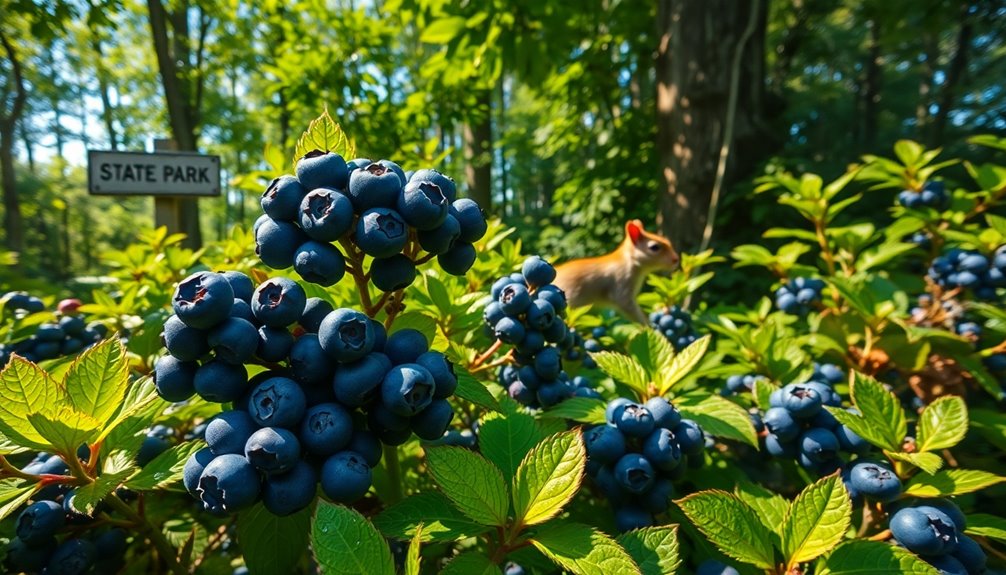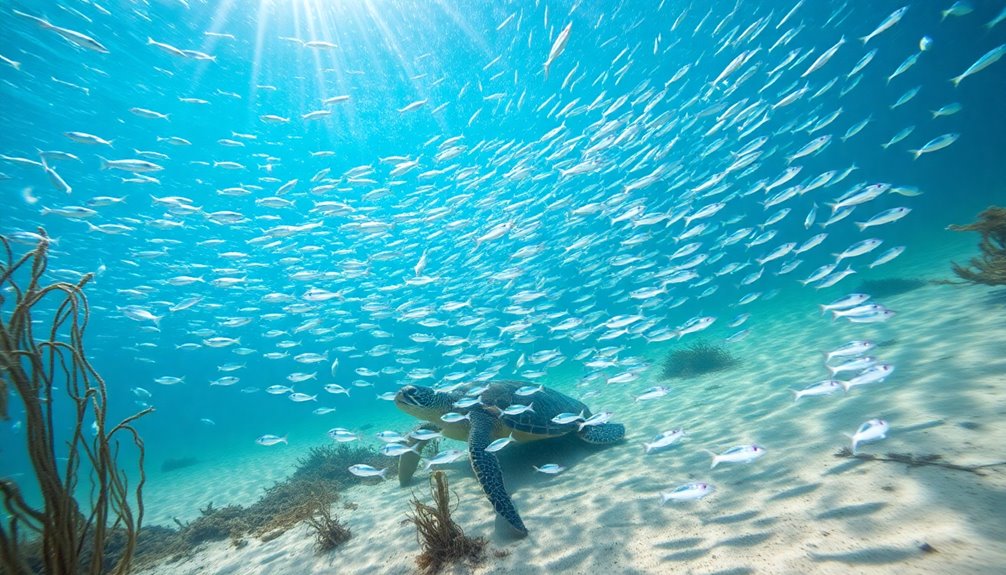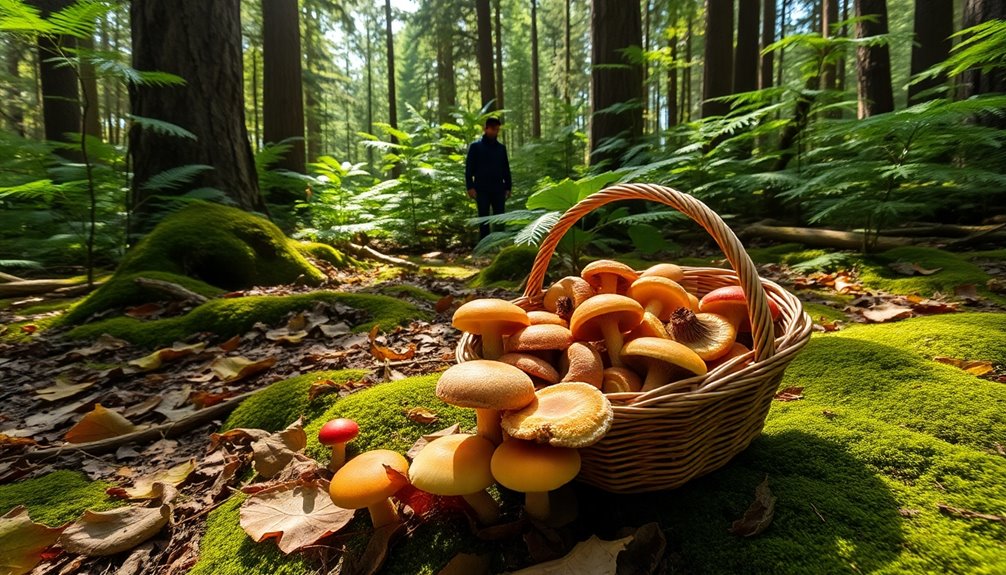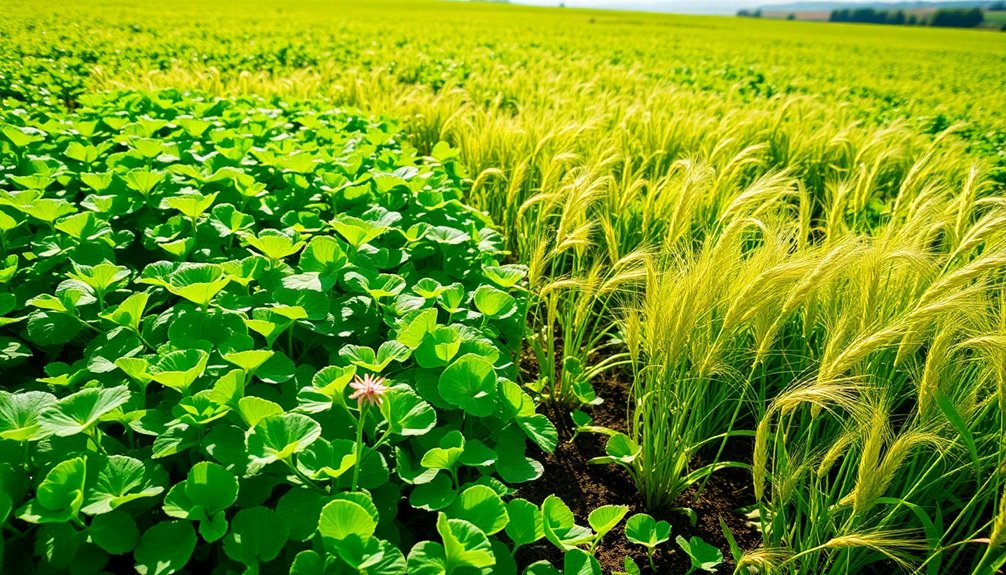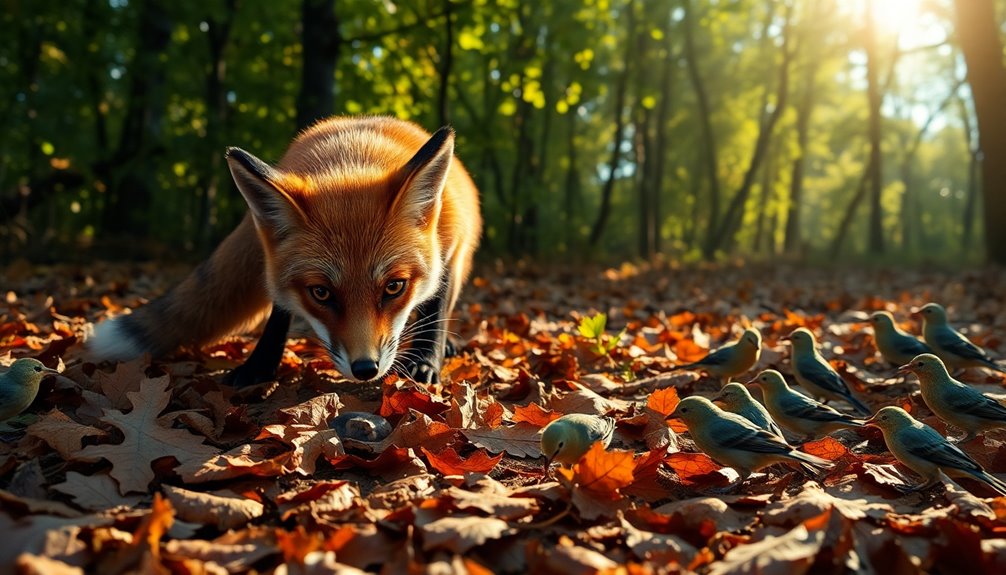You can't just forage freely in state parks. Most parks have strict regulations, often requiring permits for collecting plants or animals; fines can range from $500 to $2,100. It's important to check the specific rules of each park. Ethical foraging is crucial too: only take what you need and leave enough for the plants to regenerate. Local foraging groups can teach you the right practices and help you navigate the laws. If you think you can forage legally, you should really understand the guidelines and sustainable practices that apply. There's more to explore on this topic!
Key Takeaways
- Most state parks in Texas prohibit foraging without a permit, with fines ranging from $500 to $2100 for violations.
- Always check specific park rules regarding foraging, as regulations may vary by location.
- Foraging on private land requires permission from the landowner beforehand.
- National parks enforce a complete ban on foraging to protect natural resources.
- Sustainable foraging practices are encouraged to ensure ecological balance and biodiversity preservation.
Overview of Foraging Laws
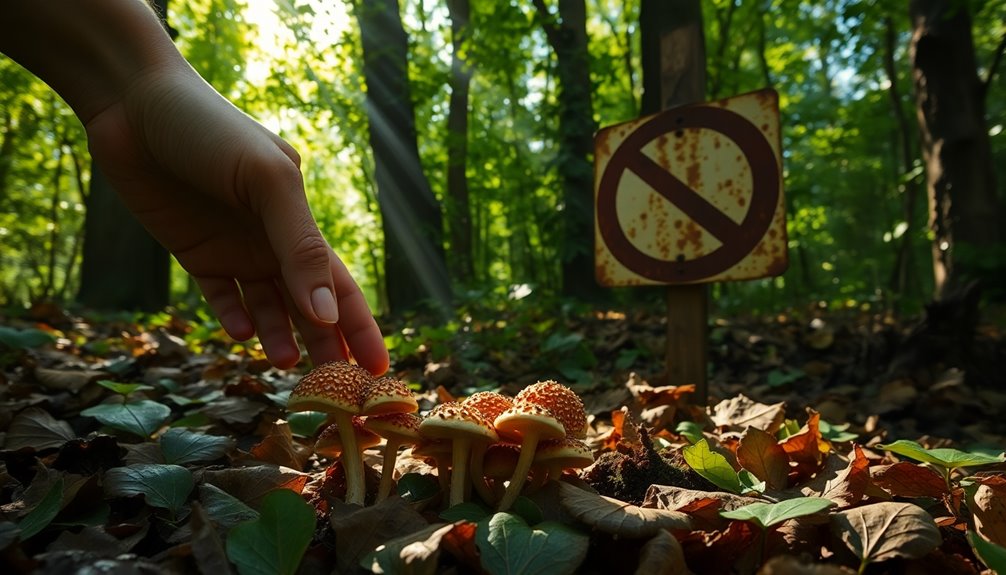
When it comes to foraging in state parks, understanding the laws is essential to avoid potential fines and legal issues. In Texas, foraging laws are particularly strict. On private land, you must obtain permission from the landowner before collecting anything.
However, state parks and public lands often have more stringent regulations. Many of these areas discourage or outright prohibit foraging activities, with fines ranging from $500 to $2100 for illegal harvesting.
The National Park Service enforces a complete ban on foraging in national parks and protected areas, highlighting the significance of compliance with these regulations.
If you're foraging in Texas National Forests, you can collect up to 1 gallon of mushrooms and 1 pint of fruits, nuts, or berries per person per day for personal use.
But keep in mind that being aware of endangered and protected plant species is vital. Collecting these can lead to significant legal penalties, including fines and possible misdemeanor charges.
Always check specific regulations before you forage, as ignorance won't protect you from the consequences.
Ethical Foraging Practices
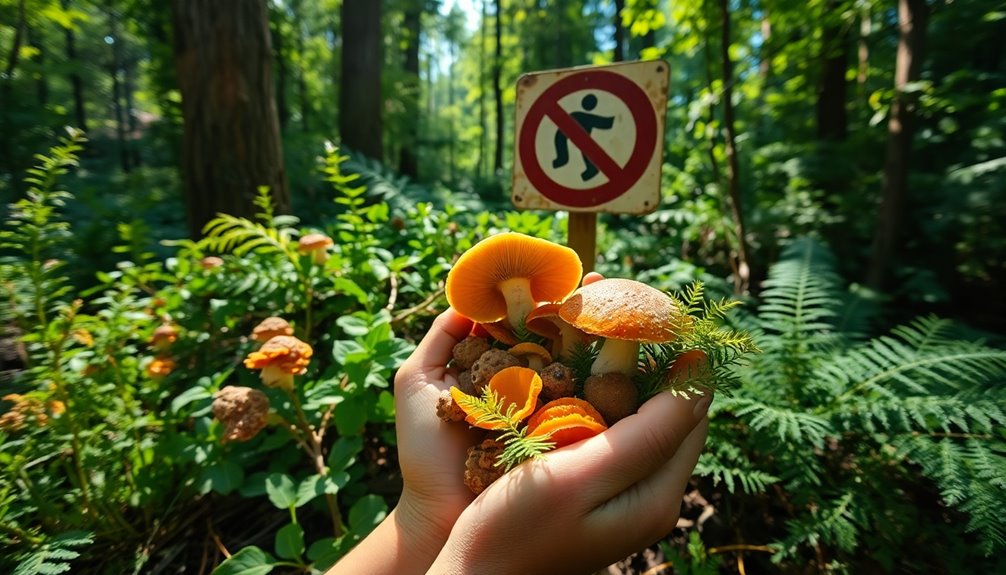
Foragers play an essential role in maintaining the health of ecosystems, and practicing ethical foraging is imperative for sustainability. When you're out harvesting plants, always take only what you need. Limit your harvest to one-third of any given plant, ensuring enough remains for wildlife and natural regeneration. This approach helps preserve the delicate balance of the ecosystem. Establishing clear rules for foraging can also enhance responsible practices.
Be mindful of where you forage. Avoid areas near roads or agricultural lands that may be contaminated with pesticides. Not only does this protect your health, but it also safeguards the ecosystem. Respect local customs and indigenous practices, as some plants hold cultural significance that requires a thoughtful harvesting approach. Additionally, understanding the local ecosystem can help you identify which plants are important for biodiversity and should be preserved.
Additionally, embrace "Leave No Trace" principles. Fill in any holes you dig and remove any trash you come across. This minimizes your environmental impact and shows respect for public land. Remember that sustainable foraging can promote ecological balance and conservation efforts, which is vital for the health of the ecosystem.
Finally, consider sharing your harvested materials with your community. Doing so fosters goodwill and promotes a collective respect for nature, strengthening community ties while encouraging sustainable practices. By engaging in effective co-parenting, you can help instill values of respect and responsibility towards the environment in future generations.
Identifying Foraging Locations
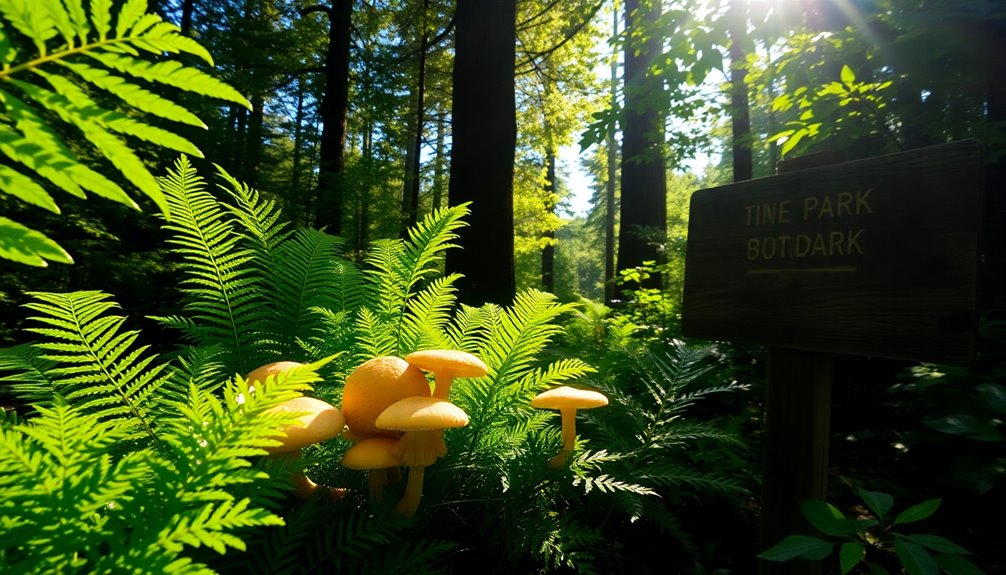
Finding the right spots for foraging can make all the difference in your experience and the sustainability of local ecosystems. When you decide to forage in state parks, it's vital to understand the regulations that govern these activities.
Most state parks prohibit the collection of plants and wildlife without a permit. Before heading out, check specific park rules to avoid illegal harvesting, which can result in fines ranging from $500 to $2100 in places like Texas.
While some public lands may allow foraging in designated areas, each state park has its own set of regulations. It's important to inquire with park officials about permissible foraging activities.
Additionally, certain public properties, such as nature reserves and urban parks, might permit foraging, but these areas are often limited and require prior permission.
Be mindful of local ordinances that may impose further restrictions on foraging in state parks. Understanding both state and local laws guarantees you're foraging responsibly and legally.
With the right knowledge and respect for regulations, you can enjoy the benefits of foraging while helping to protect native ecosystems.
Community Resources and Support
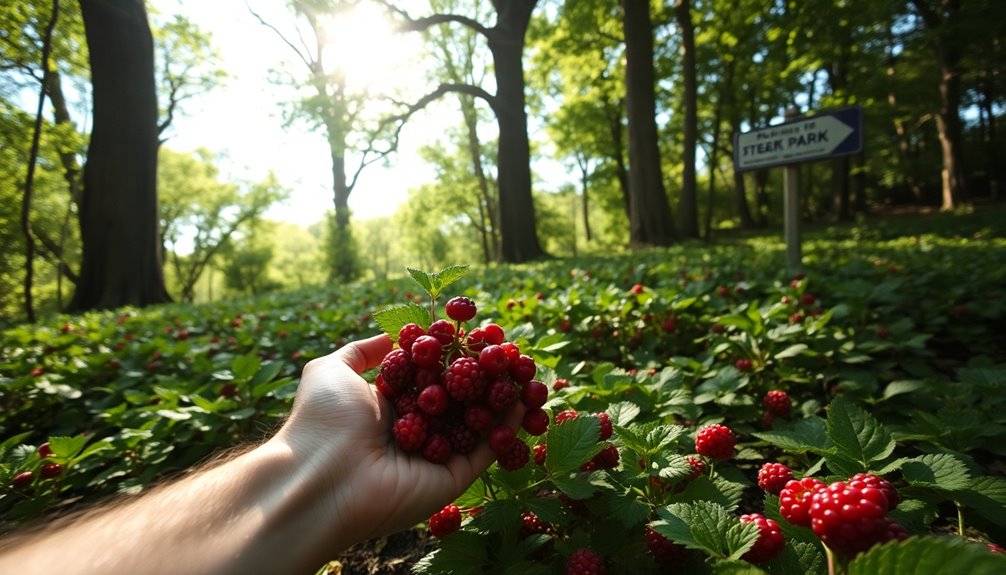
Joining local foraging groups can be a game changer for your foraging journey. These communities offer educational workshops that teach you everything from plant identification to sustainable foraging techniques. Additionally, participating in Leave No Trace principles can greatly enhance your skills while ensuring the environment is preserved for future foragers. Engaging in group activities can also foster social skills that are essential for collaborative learning experiences.
Local Foraging Groups
Connecting with local foraging groups can greatly enhance your foraging experience by providing essential resources and support. These groups often offer valuable plant identification workshops, ensuring you can confidently recognize edible plants in your area. They also emphasize ethical foraging practices, making sure you're aware of local laws and regulations governing foraging activities.
Joining a foraging club fosters knowledge sharing among enthusiasts, creating a supportive network for both beginners and seasoned foragers. You'll find that many groups organize foraging outings, allowing you to explore local ecosystems while learning hands-on about sustainable harvesting techniques. This real-world experience deepens your appreciation for the environment and the plants you forage.
Online forums and social media platforms further expand these community resources, connecting you with fellow foragers who share tips and local opportunities. Engaging with these local foraging groups promotes environmental stewardship, encouraging a mindset of respect for natural resources.
Educational Workshops Available
Local foraging groups often serve as a springboard for further learning through educational workshops that enhance your foraging skills. Many community organizations and local nature centers offer hands-on experiences focused on plant identification and sustainable harvesting practices. These workshops not only help you understand local ecosystems but also teach you how to safely identify edible versus toxic plants.
Here's a quick overview of what you might find in such workshops:
| Workshop Focus | Description |
|---|---|
| Plant Identification | Learn to differentiate between edible and toxic plants. |
| Sustainable Harvesting | Discover techniques to forage responsibly without harming ecosystems. |
| Community Engagement | Meet fellow foragers and share knowledge in a supportive environment. |
Organizations like REI frequently host classes for various skill levels, ensuring everyone can benefit. Plus, online platforms and social media groups keep you updated on upcoming events. Pairing these workshops with books and online courses can further reinforce your learning and promote responsible foraging practices. Engaging with these resources can deepen your connection to nature and enhance your foraging journey.
Environmental Impact of Foraging
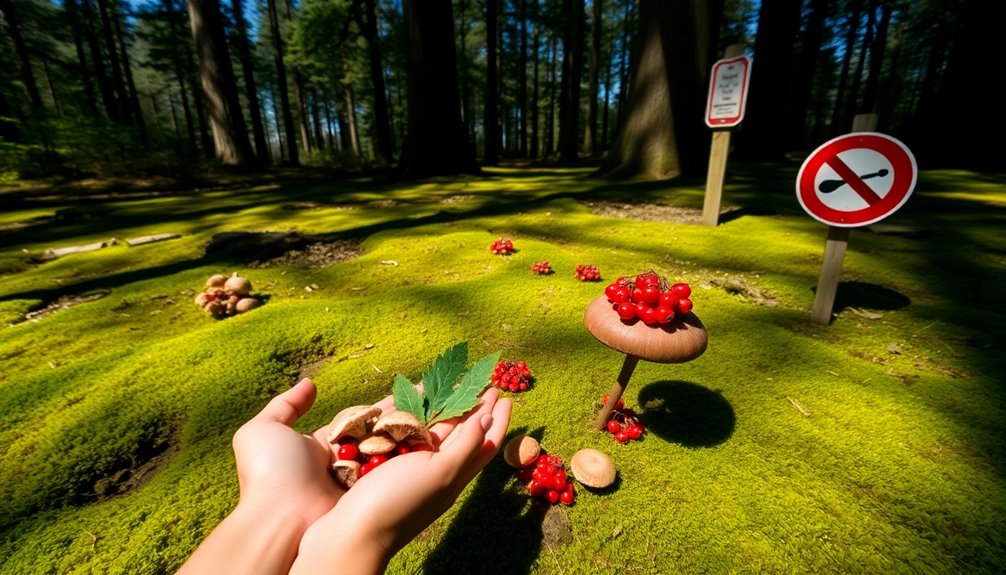
When you forage in state parks, it's essential to take into account the risk of overharvesting, which can disrupt local ecosystems. Removing too many plants can threaten biodiversity and hinder the regeneration of essential species. Additionally, foraging can lead to coastal erosion, which threatens the sustainability of beach environments. Proper foraging practices, such as sustainable harvesting, can help mitigate these impacts and promote ecological balance.
Overharvesting Concerns
Foragers need to be aware that overharvesting can seriously harm local plant populations and disrupt delicate ecosystems. When you collect more than one-third of a plant, you risk diminishing its ability to regenerate, which can lead to significant declines in biodiversity.
This is especially concerning in areas already stressed by climate change or invasive species. The cumulative impact of multiple foragers can strain fragile ecosystems, affecting not just the targeted plants but the overall health of the habitat.
To protect wild food resources for future generations and wildlife, it's crucial to adopt responsible foraging practices. Educating yourself on sustainable methods and adhering to local regulations can help mitigate the risks associated with overharvesting.
These regulations often set limits on how much you can collect, ensuring plant populations remain robust and ecosystems thrive.
Biodiversity Preservation
Overharvesting not only threatens individual plant species but also jeopardizes the overall biodiversity of ecosystems.
When you forage irresponsibly, you risk disrupting the delicate ecological balance that sustains wildlife and plants alike. This makes it vital to understand the impact of your actions.
Here are four reasons to practice responsible foraging:
- Protect Endangered Species: Many rare plants need our protection; overharvesting can push them closer to extinction.
- Support Local Flora: Healthy ecosystems rely on diverse plant life; foraging can help or harm this diversity.
- Preserve Wildlife Habitats: Disturbing plant populations can impact the animals that depend on them for food and shelter.
- Contribute to Conservation: By following regulations and guidelines, you actively support the preservation of biodiversity.
To minimize your environmental impact, educate yourself on local flora and recognize protected species.
Adopt responsible practices, like taking no more than one-third of a plant, to guarantee its survival and regeneration.
Advocacy for Foraging Rights
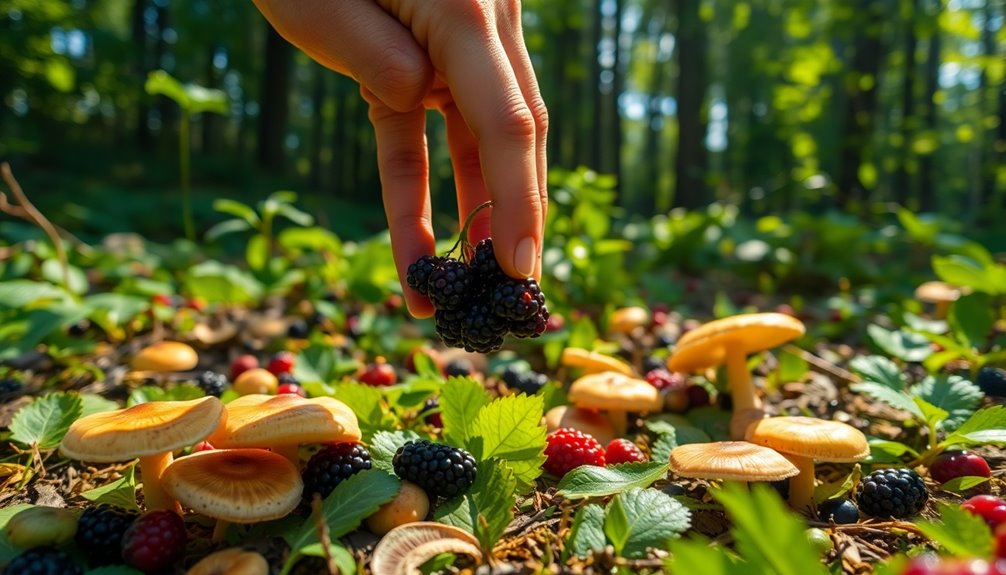
Advocacy for foraging rights has gained momentum as more people seek to reconnect with nature through the gathering of wild foods. This movement emphasizes the need for clearer regulations in state parks, allowing you to forage responsibly while promoting public engagement with natural resources.
Proponents believe that foraging can cultivate a sense of stewardship and conservation among park visitors, fostering a greater investment in preserving park ecosystems.
Community initiatives and local foraging groups are actively pushing for legislative changes that permit foraging, highlighting the importance of sustainable practices and responsible harvesting. Advocacy efforts focus on the disconnect between existing laws that restrict foraging and the rising public interest in wild food gathering.
Supporters encourage park authorities to evaluate the ecological impact of foraging, advocating for regulations that balance visitor enjoyment with the preservation of natural resources.
As you engage in these discussions, remember that advocating for foraging rights not only benefits you but also enhances the overall health of the environment.
Frequently Asked Questions
Is Foraging Legal in State Parks?
Foraging in state parks often isn't legal. Most parks have strict regulations to protect local ecosystems, and you could face hefty fines for unauthorized harvesting.
While some states might allow limited foraging under specific conditions, it's crucial to check local laws first.
Always remember, removing or disturbing plants without permission can harm wildlife habitats. To avoid penalties, familiarize yourself with the rules of the area you're interested in exploring.
Can You Forage From Parks?
You can't just forage in parks without checking the rules first.
Most state parks prohibit the removal of natural resources, including plants and mushrooms, without a permit. If you're caught, you might face hefty fines.
Some public lands might allow foraging in designated areas, but you'll need to know the local guidelines.
Always get permission before foraging anywhere, as unauthorized collection can lead to both legal trouble and environmental harm.
Can I Forage in PA State PArks?
You might think foraging in Pennsylvania state parks is a wonderful way to connect with nature, but it's not that simple.
Generally, you can't collect plants or mushrooms without a permit. While some permits exist for educational purposes, they're hard to get.
It's essential to check with the Pennsylvania Department of Conservation and Natural Resources for the latest rules.
Consider joining guided foraging programs instead, and learn about the local flora legally and safely.
Where Is It Legal to Forage in the US?
You'll find that foraging legality varies across the U.S. In states like Alaska and Hawaii, foraging is generally allowed, while places like Arkansas and California have strict bans on state-owned lands.
In urban areas like New York City, foraging is completely prohibited in parks. Always check local regulations before foraging, as enforcement can lead to hefty fines.
Being aware of the rules will help you forage responsibly and legally.
Conclusion
In the world of foraging, knowledge is your greatest ally. While state parks often have strict laws, understanding these regulations can open up a treasure trove of opportunities. By practicing ethical foraging and connecting with community resources, you can enjoy nature's bounty responsibly. Remember, every foraged item is a tiny piece of nature's puzzle, contributing to the bigger picture. So, let's advocate for foraging rights and guarantee future generations can explore this wild, delicious pantry!

